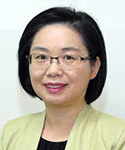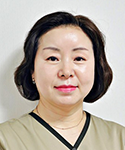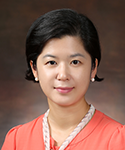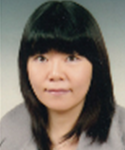Program details
-
S4 Education and integrated care - education (K)
Diabetes care and education for young-onset T2D
Chair(s): Kang Seo Park, Dong-Hyeok Cho
Friday 20 October, 09:00~10:40
Room 4 (2F)
-
The prevalence of young-onset type 2 diabetes mellitus is rapidly increasing worldwide and person-centered self-care education and diabetes support are essential to achieving diabetes treatment goal. In this session five speakers will present effective treatment strategy for young-onset type 2 diabetes, including new technology education, special diets, exercise and psychosocial support.
-
-
 S4-1
S4-1
Ye Seul Yang
Seoul National University, Korea
-
Clinical characteristics and treatment strategy of young-onset type 2 diabetes
-
 S4-2
S4-2
Kang Hee Sim
Samsung Medical Center, Korea
-
Education strategies using new technology of diabetes care
-
 S4-3
S4-3
Yun Mi Chung
Kyung Hee University Medical Center, Korea
-
Application of special diet in young patients with diabetes
-
 S4-4
S4-4
Seung Jae Jeong
Samsung Medical Center, Korea
-
Exercise recommendations for young patients with diabetes
-
 S4-5
S4-5
Junyoung Kim
Hallym University Dongtan Sacred Heart Hospital, Korea
-
Psychosocial evaluation and care tips for young patients with diabetes
-
S8 Education and integrated care - self care (K)
Integrating diabetes technology into the clinical diabetes care and education
Chair(s): Jae Myung Yu, Minjeong Gu
Friday 20 October, 16:00~17:40
Room 4 (2F)
-
New diabetes-related technologies can help patients with diabetes optimize their blood sugar levels, reduce the risk of acute and chronic complications, reduce the burden of managing diabetes, and improve their quality of life. Diabetes educators are struggling to keep up with this pace of technology change. However, this is not enough for educators to increase their knowledge of diabetes skills. Therefore, in this session, we would like to discuss how diabetes technology can be effectively integrated into the clinical paradigm and the role of diabetes educators in this regard.
-
-
 S8-1
S8-1
Jung Hwa Lee
Kyung Hee University Hospital at Gangdong, Korea
-
The diabetes educator's role in CGM world
-
 S8-2
S8-2
Su Ji Lee
Kangbuk Samsung Hospital, Korea
-
Role of diabetes educators in lowering barriers to insulin pump therapy
-
 S8-3
S8-3
Miae Yoon
Korea University Anam Hospital, Korea
-
Using smart pen and digital apps for diabetes management
- Panel discussion
-
-
 S8-Panel 1
S8-Panel 1
Ji Min Hong
Kyungpook National University Hospital, Korea
-
 S8-Panel 2
S8-Panel 2
Hae Eun Park
Kyung Hee University Medical Center, Korea
-
 S8-Panel 3
S8-Panel 3
Young Sun Youn
Kosin University Gospel Hospital, Korea
-
S11 Education and integrated care - nutrition
Medical nutrition therapy on non-face-to-face for diabetes management
Chair(s): Suk Chon, Sung Nim Han
Saturday 21 October, 09:00~10:40
Room 4 (2F)
-
The COVID-19 pandemic has brought about various restrictions around the world, and its impact on healthcare has been enormous: RDs have had to shift from in-person interactions with clients to telenutrition consultations, encountering obstacles. Remote nutrition can enable RDs to maintain normal workloads and provide patients with uninterrupted access to nutritional healthcare. It is important that RDs using telemedicine resources possess the ability to provide high-quality, efficient, and secure services using evidence-based guidance. Telenutrition has the potential to revolutionize our healthcare system, save money, and engage patients in their health to create lasting preventative changes.
-
-
 S11-1
S11-1
Jung Eun Lee
Seoul National University, Korea
-
Dietary assessment and monitoring in telenutrition
-
 S11-2
S11-2
Lisa Andrews
Sound Bites Nutrition, USA
-
The use of telenutrition medical nutrition therapy for diabetes in the US
-
 S11-3
S11-3
Shin Ok Park
Noom Korea, Korea
-
Non-face-to-face nutrition intervention for chronic disease treatment in clinic
-
S15 Diabetes care and education (K)
Diabetes journey: role of diabetes educator
Chair(s): Nan Hee Kim, Jeong Hyun Lim
Saturday 21 October, 13:00~14:40
Room 4 (2F)
-
Despite the remarkable advances in diabetes management technology, the importance of diabetes education to effectively utilize it is still emphasized. People with diabetes can be overwhelmed with all the work they have to do to stay healthy, and they can struggle with it. Therefore, the role of diabetes educators is very important here. In this session, we would like to discuss the role of diabetes educators as diabetes prevention facilitator, diabetes self-management coach, problem-solving supporters and exercise partner.
-
-
 S15-1
S15-1
Seokyung Park
Kyung Hee University, Korea
-
Facilitator for diabetes prevention
-
 S15-2
S15-2
Min Kyong Kim
Seoul Asan Medical Center, Korea
-
Coaching for diabetes management
-
 S15-3
S15-3
Donghee Yang
Ilsan Paik Hospital, Korea
-
Supporter for problem solving
-
 S15-4
S15-4
Dongcheol Kim
Inha University Hospital, Korea
-
Partner for physical activity
 S4-1
S4-1 S4-2
S4-2 S4-3
S4-3 S4-4
S4-4 S4-5
S4-5 S8-1
S8-1 S8-2
S8-2 S8-3
S8-3 S8-Panel 1
S8-Panel 1 S8-Panel 2
S8-Panel 2 S8-Panel 3
S8-Panel 3 S11-1
S11-1 S11-2
S11-2 S11-3
S11-3 S15-1
S15-1 S15-2
S15-2 S15-3
S15-3 S15-4
S15-4


